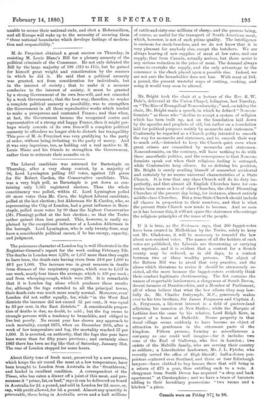Mr. Bright took the chair at a lecture of the
Rev. R. W. Dale's, delivered at the Union Chapel, Islington, last Tuesday, on "The Rise of Evangelical Nonconformity ; " and, on taking the chair, Mr. Bright made a speech, in which he defined " Noncon- formists " as those who " decline to accept a system of religion which has been built up, not on the foundation laid down by the apostles and prophets of old, but rather on a foundation laid for political purposes mainly by monarchs and statesmen." Conformity he regarded as a Church polity intended to smooth the way for monarchs and statesmen, and to smooth their way to much evil,—intended to keep the Church quiet even when great crimes are committed by monarchs and statesmen. Nonconformists, on the contrary, will have nothing to do with these anmsthetic politics, and the consequence is that Noncon- formists speak out when their religious feeling is outraged, while Conformists keep silence. In so defining his position, Mr. Bright is surely availing himself of somewhat accidental and certainly by no means universal characteristics of a State Church. It is true that any class Church will do its duty im- perfectly, and that almost all English Churches have for cen- turies been more or less of class Churches, the chief Dissenting Churches of the present day being, for instance, almost entirely middle-class Churches. But a true State Church should include all classes in proportion to their numbers, and that is what the present State Church now tends to become. And so soon as it has become this, it will not spare the statesmen who outrage the religious principles of the mass of the people.


































 Previous page
Previous page